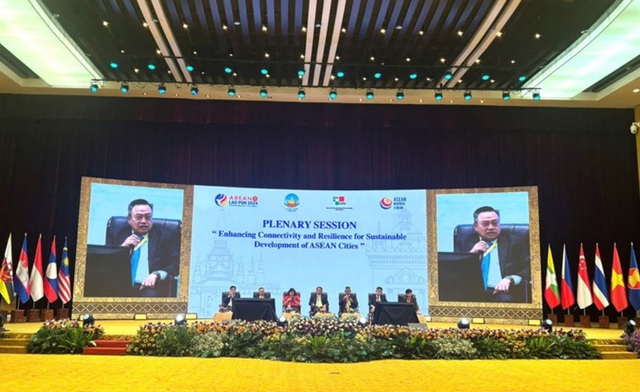Chairman Tran Sy Thanh attends Meeting of Governors and Mayors of ASEAN Capitals in Vientiane
VGP - Chairman of the Ha Noi People's Committee Tran Sy Thanh attended and delivered a keynote speech at the plenary session of the Meeting of Governors and Mayors of ASEAN Capitals (MGMAC) and ASEAN Mayors Forum (AMF) held in Vientiane, Lao on September 18.

Chairman of Ha Noi People's Committee Tran Sy Thanh speaks at the plenary session of the Meeting of Governors and Mayors of ASEAN Capitals (MGMAC) and ASEAN Mayors Forum (AMF) held in Vientiane, Lao, September 18, 2024
The Mayor highlighted the Vietnamese Party and Government's commitment to investing in agriculture, farmers, and rural development. He underscored that closing the gap between urban and rural areas is one of the country's vital strategies for achieving comprehensive and sustainable growth.
Chairman shared several key lessons as followed:
First, Ha Noi focuses on integrated infrastructure development, with significant investment in transportation, especially roads connecting urban and rural areas. Currently, over 10 percent of land is dedicated to transportation, with a target of 12-15 percent by 2025. This includes improvements in irrigation, agricultural infrastructure, and industrial zones, all of which enhance trade, logistics, and market access for rural residents.
Second, Ha Noi is advancing its rural economy through green and circular initiatives. The city promotes high-tech agriculture and the OCOP (One Commune, One Product) program, featuring nearly 2,000 products. These efforts create jobs and income for farmers while protecting the environment and maintaining ecological balance, contributing to sustainable development. The average income in rural Ha Noi is approximately US$3,000 per person.
Third, Ha Noi prioritizes investment in healthcare, education, and culture in rural areas to ensure equitable access to comprehensive education and training. This focus enhances farmers' skills and competencies, setting the stage for increased productivity and competitiveness. The city emphasizes career-oriented education policies and integrates STEM subjects into curricula, aligning with broader development trends and the demands of the Fourth Industrial Revolution.
Fourth, Ha Noi utilizes digital technology to bridge the urban-rural divide, promoting digital transformation in governance and public services. This initiative enhances residents' access to information and services in administration, healthcare, and education while fostering innovation and entrepreneurship.
Fifth, Ha Noi prioritizes social welfare and residents' quality of life, accentuating healthcare and the use of information technology in medical services and preventive health measures. The city closely monitors community health and maintains strong social assistance programs, with over 7.8 million people enrolled in health insurance (95 percent coverage) and 99.9 percent of children in needy circumstances receiving support. As a result, no households are classified as poor according to national standards.
Chairman of the Ha Noi People's Committee Tran Sy Thanh envisions Ha Noi as a "Cultural, Civilized, Modern" capital that is green, smart, and globally competitive. Moving forward, the city aims to develop an "Ecological Agriculture, Modern Rural Areas, and Civilized Farmers" framework, focusing on several tasks and solutions, as follows:
In line with Government directives, Ha Noi has invested significantly over the past decade in developing "New Rural Areas," prioritizing infrastructure for agriculture and rural communities.
Key advancements include improved transportation and irrigation, the establishment of industrial zones, specialized production areas, and renowned traditional crafts. High-quality OCOP products are now successfully entering demanding markets like Europe and the US, leading to a remarkable transformation in the rural areas' economic and cultural landscape.
Identifying six key tasks and solutions
Chairman of the Ha Noi People's Committee Tran Sy Thanh envisions Ha Noi as a "Cultural, Civilized, Modern" capital that is green, smart, and globally competitive. Moving forward, the city aims to develop an "Ecological Agriculture, Modern Rural Areas, and Civilized Farmers" framework, focusing on several tasks and solutions such as (1) empower rural residents:; (2) advance sustainable agriculture; (3) restructure agriculture to leverage tropical advantages; (4) promote ecological farming; (4) prioritize investment in circular livestock farming for environmental protection and disease safety; (5) build Sustainable Rural Communities; (6) manage resources efficiently; and (7) encourage Community Engagement.
After its administrative expansion in 2008, Ha Noi spans over 3,300 square kilometers and consists of 30 administrative units (12 districts, 17 rural districts, and one town).
At that time, it boasted a significant agricultural area of approximately 200,000 hectares, accounting for 59 percent of its total land.
The rural population exceeded 4.2 million, representing over 50 percent of the city's total population, with around 2.3 million people employed in rural sectors, making up more than 56 percent of the workforce.
The rural outskirts were recognized as economically disadvantaged, facing severe infrastructure challenges, especially in agriculture, where production remained small-scale and fragmented.
The Vietnamese delegation, led by Chairman of the Ha Noi People's Committee, Tran Sy Thanh, participated in the event alongside representatives from the capitals and cities of ASEAN member countries.
Attending the event were representatives from the capitals and cities of ASEAN member countries, as well as ASEAN Secretary-General Kao Kim Hourn./.

